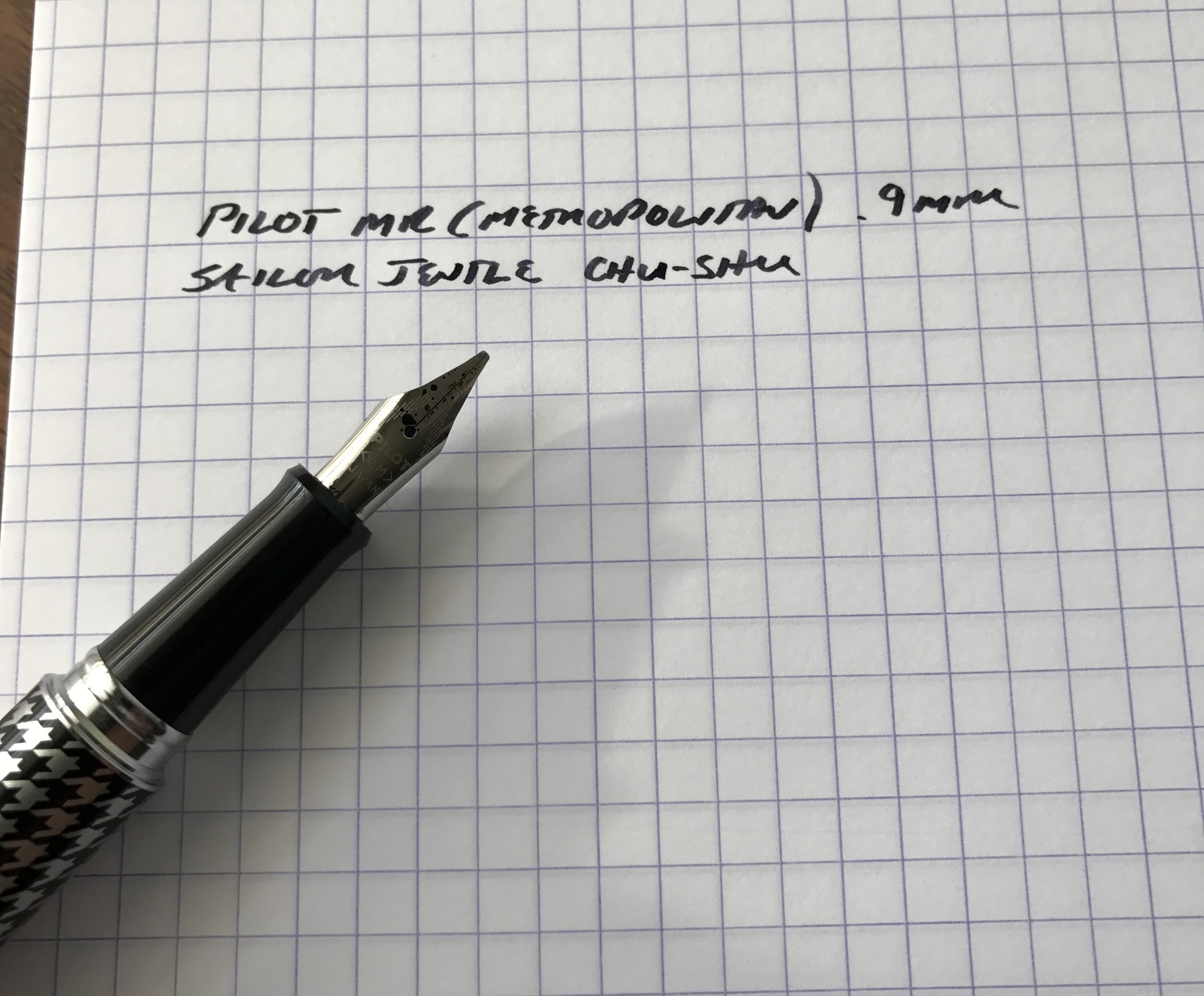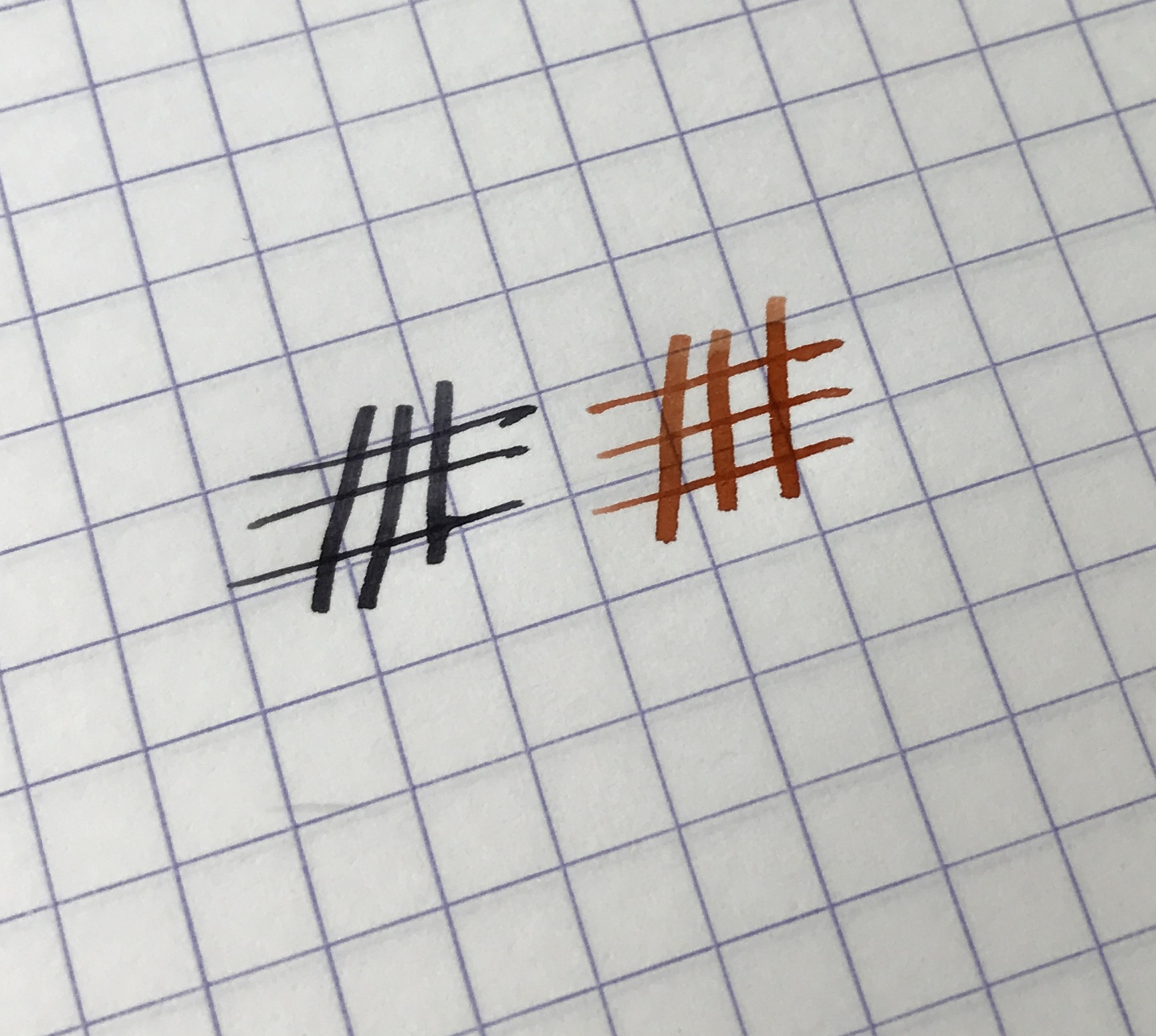I've written before on nib customization, and how much fun it can be to attend a pen show and have a nib technician (or "nibmeister") grind a nib into something more unique than your standard fine, medium, or broad. But what if you can't get to a pen show, or you don't know that you want to spend $40-70 to have the nib on one of your pens irreversibly modified? If you're interested in trying something different, I'd recommend that you start with a stock stub, available at price points as low as $15.
What is a stub nib?
Two of my favorite stock stub nibs: left, the Pilot Metropolitan, and right, the TWSBI Eco 1.1mm.
A stub is an italic-style nib that will give you the line variation of a formal italic (i.e., thick downstrokes and thinner horizontal cross-strokes - see pictures below) but isn't so sharp that you can't use the nib as a daily writer. A stub nib is squared off, like an italic, but with more tipping material and rounded edges to help the nib write smoothly. While I personally can tolerate a bit more "crispness" in my italic nibs, when I first started out in the pen hobby I used a lot of stubs because they are so easy/pleasant to write with, and still break them out from time to time.
Note: Most stock steel stubs are technically better described as a hybrid between a stub and an italic - they don't have much, if any tipping material, though their edges have been smoothed significantly, to the point where I don't have a problem referring to them as "stubs."
Best Standard Stock Stub Nibs
Those interested in trying a stub-nib fountain pen have a lot of low-cost options to choose from. Here I'm going to limit myself to four recommendations, though others do exist. Some of these pens even feature interchangeable nibs and screw-in nib units, so if you end up not liking the stub nib, you can swap it out for something more to your liking.
- Pilot Metropolitan. Pilot recently released its $15 Metropolitan with a 1.0mm steel stub nib. Previously, if you wanted a steel stub by Pilot, you had to purchase a Plumix calligraphy pen and swap the nib on the Plumix into the Metropolitan. While this stub probably falls more on the "italic" end of the spectrum - there's not a lot of tipping material at all and it's crisper than the TWSBI - it's still a smooth nib that's not too wet. I've been using this off and on for the past couple of weeks at work without any major issues even on the cheapest of paper. (My review of the Metropolitan)
- TWSBI Eco 1.1mm Stub Nib. At the $30 price point, you can purchase the piston-filling TWSBI Eco with a stub option. TWSBI stubs are also very smooth, and I find them rather wet, depending on the ink you choose. If you'd like the ability to change nibs more easily, consider the TWSBI 580, Diamond Mini, or Vac Mini, which are more expensive but allow you to purchase aftermarket interchangeable nib units. You can change the nib on a TWSBI Eco, but the nibs aren't sold separately - you'd have to purchase a new pen and pull the nib (or trade nibs with someone else you know). (My review of the TWSBI Eco)
- Conklin Stub Nibs. A couple months ago I had the opportunity to try out a Conklin Mark Twain Crescent Filler with a stub nib, and came away very impressed. Conklin pens are manufactured by Stipula in Italy, and you can find them at price points as low as $52 (or even below that with a discount code). If you like Conklin's designs, their stub is a great option. (My Review of the Conklin Mark Twain)
- Lamy Italic Nibs. Finally, Lamy sells stub/italic nibs in widths ranging from 1.1mm to 1.9mm, that fit the Safari, Studio, and AL-Star line of pens. (Links are to my reviews of those pens.) These nibs are typically sold separately - Lamy nibs feature a proprietary design that allows you to easily slide them on/off the pen. I've had mixed experiences with Lamy nibs, so I'm hesitant to give them a glowing recommendation since they can be somewhat sharp writers and a bit drier than the other recommendations on here.
As I mentioned, this post is not intended to serve as a comprehensive guide to stock specialty nib options - just a starting point. Many pen companies such as Pelikan, Montblanc, Aurora, etc. offer stock stub, oblique, and italic options, albeit at a much higher price point than the pens discussed here. If you own a pen that accepts JoWo nib units (like many custom pens from Edison, Shawn Newton, etc.), you may also want to consider Franklin-Christoph specialty nib units, many of which are hand-ground by Mike Masuyama. Again, they will run you a bit more, but the quality and variety is exceptional. I may do a stand-alone post discussing these nibs in the future!
Disclaimer: The Pilot and TWSBI pens featured in this review were purchased with my own funds, for my own collection, from Anderson Pens, a sponsor of this blog. This post also contains affiliate links.



